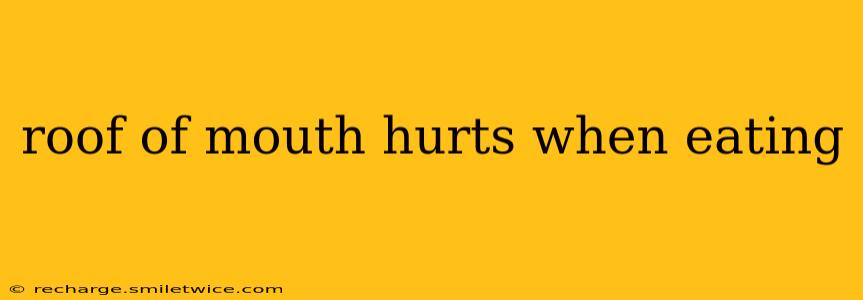Experiencing pain on the roof of your mouth while eating can be incredibly uncomfortable and disruptive. This seemingly simple issue can stem from a variety of causes, ranging from minor irritations to more serious underlying conditions. Understanding the potential reasons behind this pain is the first step towards finding relief. This comprehensive guide explores the common culprits and offers insights into effective treatment options.
What Causes Roof of Mouth Pain While Eating?
The roof of your mouth, also known as the palate, is a sensitive area. Pain in this region during eating can be triggered by several factors:
1. Minor Injuries and Irritation:
- Burns: Hot foods or drinks are a frequent cause of palate burns, leading to immediate and intense pain. The severity depends on the temperature and duration of exposure.
- Cuts or Abrasions: Accidental injuries from sharp foods (like potato chips or crackers) or even rough toothbrush bristles can cause painful sores.
- Ill-fitting Dentures: Dentures that are poorly fitted or improperly adjusted can rub against the palate, causing irritation and sores.
- Dry Mouth: A lack of saliva can make the palate more susceptible to irritation and dryness, increasing sensitivity to food.
2. Oral Health Issues:
- Mouth Sores (Aphthous Ulcers): These are small, painful ulcers that can appear anywhere in the mouth, including the palate. Their cause is unknown, but stress, hormonal changes, and vitamin deficiencies are potential contributing factors.
- Canker Sores: Similar to aphthous ulcers, canker sores are small, shallow ulcers that can be quite painful. They often appear on the soft palate.
- Oral Thrush (Candidiasis): This fungal infection can cause a white, creamy coating on the palate and lead to pain and discomfort, especially when eating.
- Gingivitis/Periodontitis: While primarily affecting the gums, severe gum disease can sometimes lead to inflammation that affects the palate.
3. Systemic Conditions:
- Vitamin Deficiencies: Deficiencies in certain vitamins, particularly B vitamins, can affect the health of the oral mucosa and increase susceptibility to mouth sores.
- Allergies: Certain food allergies can cause inflammation and irritation in the mouth, including the palate.
- Autoimmune Diseases: Conditions like lupus or Sjögren's syndrome can manifest as oral lesions and pain.
How to Treat Roof of Mouth Pain While Eating
Treatment depends heavily on the underlying cause. Here's a breakdown of common approaches:
For Minor Injuries and Irritation:
- Avoid Irritants: Stay away from hot foods, spicy foods, acidic foods, and anything rough or sharp until the area heals.
- Gentle Cleaning: Rinse your mouth with warm salt water several times a day to help clean the area and promote healing.
- Over-the-Counter Pain Relievers: Topical anesthetics like benzocaine or lidocaine can provide temporary pain relief.
- Hydration: Drink plenty of water to keep your mouth moist and aid healing.
For Oral Health Issues:
- Anti-fungal Medications: For oral thrush, your dentist or doctor will prescribe an anti-fungal medication.
- Prescription Medications: For recurring mouth sores or more severe infections, medication may be necessary.
- Improved Oral Hygiene: Maintain excellent oral hygiene by brushing and flossing regularly. Consider using a soft-bristled toothbrush to prevent further injury.
- Dental Consult: A dentist can diagnose and treat underlying dental problems, such as ill-fitting dentures or gum disease.
For Systemic Conditions:
- Medical Evaluation: If the pain is persistent, severe, or accompanied by other symptoms, seek medical attention for diagnosis and treatment. Your doctor may order blood tests to check for vitamin deficiencies or other underlying health problems.
When Should You See a Doctor or Dentist?
It's crucial to seek professional help if:
- The pain is severe or persistent.
- The pain is accompanied by fever, swelling, or other systemic symptoms.
- You have recurring mouth sores or ulcers.
- You suspect an underlying medical condition.
Frequently Asked Questions
What home remedies can I use for roof of mouth pain?
Several home remedies can provide temporary relief. Rinsing your mouth with warm salt water is a simple and effective way to clean the area and reduce inflammation. Applying a small amount of honey or aloe vera gel can also soothe the affected area. Avoid acidic or spicy foods to minimize irritation.
Can stress cause roof of mouth pain?
Yes, stress can exacerbate existing conditions or contribute to the development of mouth sores, increasing the likelihood of pain on the roof of your mouth. Managing stress through techniques like relaxation exercises or meditation can be beneficial.
Is roof of mouth pain a symptom of something serious?
While many causes of roof of mouth pain are benign, it can sometimes indicate a more serious underlying condition, such as an autoimmune disease or vitamin deficiency. Persistent or severe pain warrants a medical evaluation.
How long does roof of mouth pain usually last?
The duration of pain varies widely depending on the cause. Minor injuries may heal within a few days, while more serious conditions may require longer treatment.
This information is for general knowledge and doesn't constitute medical advice. Always consult with a healthcare professional for diagnosis and treatment of any medical condition.
